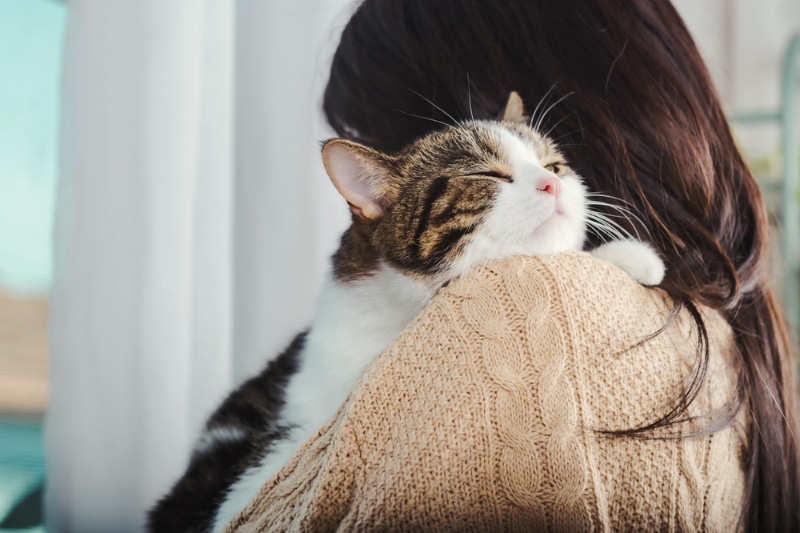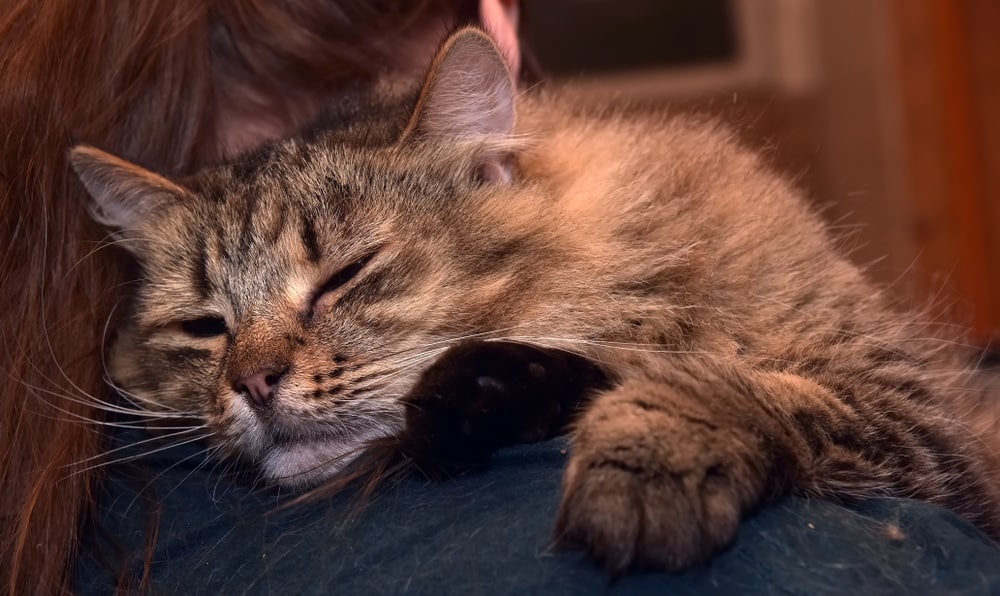For most cat parents, it warms their hearts for their cat to climb up in their lap and nuzzle their necks or anywhere else. Usually, a cat will knead your chest or lap while nuzzling and purring. It makes you laugh, sigh, and love your cat even more, every time they do it.
Have you ever wondered why your cat nuzzles you? Cat nuzzling is when your cat rubs their head and face somewhere on your body. It’s also known as a “headbutt”. Cats nuzzle for a couple of reasons, and we’ll discuss them below, so you’ll understand your feline’s intentions.
How Does Your Cat Nuzzle?
By definition, nuzzling is an action where you touch, press, or rub someone or something in a gentle way that shows love. Other terms for cat nuzzling include nudging, rubbing, prodding, bunting, and, as mentioned earlier, headbutting.
Your cat may rub their face against your neck, hands, or even your face. This happens mostly when you’re distracted, like on the computer for work or watching TV. Does this mean your cat is trying to get your attention? Does it mean your cat is trying to show their love?

The Reasons Cats Nuzzle
Cats nuzzle their owners for a few reasons. However, broadly speaking, nuzzling is perceived as a form of positive interaction. Below we’ll give you some of the most common reasons your cat could be engaging in nuzzling behavior.
1. Your Cat Is Showing Affection
The most probable reason that your cat is nuzzling your face is to feel closer to you and show you affection. Many cats do so while cuddling, and the nuzzling is associated with other positive body language cues, such as kneading on you, gently meowing, napping in your lap, and purring constantly.

2. Your Cat Wants Attention
Cats also nuzzle their owners because they want their attention. Have you ever noticed that it’s usually when you’re doing something else, like working, reading, talking to a friend, or watching TV, that your cat wants to nuzzle? This may be your cat’s way of saying, “pay attention to me!” This is more likely if, in the past, your cat managed to successfully get your attention by nuzzling you. Your cat may quickly put two and two together and realize that nuzzling you is a surefire way to get your attention.
3. Your Cat Is Saying Hello
Cats sometimes nuzzle their owners as a way to say hello. If your cat nuzzles you more when you’ve been at work all day or gone for whatever reason, they might be telling you they’re glad that you’re home.

4. Your Cat Is Scenting Marking You
Intrinsically, all pet cats are territorial, and your cat may be nuzzling you to mark you as their own. When your cat nuzzles you, they’re transferring their unique scent to you and marking you “theirs” at the same time. Most cats do this when they’re also cuddling with you, it’s unlikely for your cat to nuzzle you in this sense and just walk away.

Final Thoughts
Cat nuzzling is when your cat rubs their head and face against parts of your body. If your cat nuzzles you, it could be for various reasons; however, generally speaking, it’s nothing to worry about and this behavior is considered a form of positive interaction. Cat nuzzling is adorable, and most of us love it when our cats do it.
For example, if your cat is nuzzling you, it is possible that your cat enjoys your attention. At other times, they may be doing it as part of a cuddling session. If your cat enjoys nuzzling you, it’s a sure sign that you’re doing something right as a pet owner! Therefore, you should definitely congratulate yourself for being such an integral part of your pet cat’s life.
Featured Image Credit: I Wei Huang, Shutterstock











